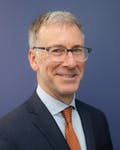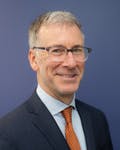Faith & Finance
4 min read

Holistic Approach to Sustainable Investing

by David A. Klassen, CFA
President and Chief Executive Officer, Pension Boards-United Church of Christ.
Combating Climate Change, Ending Human Trafficking, and Capitalizing Underserved/Underrepresented Groups
We all agree on the mission—invest the assets held in trust for retirement wisely and prudently, while maximizing the positive impact on climate change, human rights and providing capital to empower those challenged by a lack of economic access.
But how is this accomplished? It is going to take more than just an investment here and a letter campaign there. It will have to transcend any one strategy in favor of a multi-strategy, comprehensive design for success. It will require the expertise and support of more than just one person, investment analyst or manager to accomplish. How then do we proceed?
We are all aware of the absolute urgency of climate change and how combatting it is deeply important not only to the preservation of creation but also to our very survival. Not only do we put money into green strategies, like green bonds, but also into companies with high carbon footprints that have strategies to move toward more sustainable business models. Some of those investments appear in our Global Sustainability Index Fund (GSIF) option for those investing in retirement.
We are all aware of the absolute urgency of climate change and how combatting it is deeply important not only to the preservation of creation but also to our very survival.
The Global Sustainability Index Fund is a mutual fund centered on companies with the best records of moving toward sustainability as measured by several criteria. We need not only pure green options but also transitional ones to bring about the rapid change needed.
Beyond the issue of climate (but in no way separate) is human rights, and there is perhaps no more pressing concern than human trafficking, indentured servitude, and outright slavery. The Interfaith Center on Corporate Responsibility (ICCR), through its members including the Pension Boards-UCC and United Church Funds, have pressed several strategies for addressing this moral and personal tragedy. Currently, almost 25 million people are trapped in conditions of forced labor that generate $150 billion in profits for others. ICCR identified eight companies and asked them to look at the human rights and trafficking risks in their operations and supply chains. Four shareholder resolutions generated out of that request were passed by shareholders, emphasizing due diligence processes for identifying human rights violations.
Finally, through investments in private equity companies, the Pension Boards is capitalizing health care access for women and children in Africa, Palestinian owned businesses on the West Bank, and global human capital development through educational technology, and knowledge services and training. These investments are meant to give access to educational and entrepreneurial opportunities for underserved persons.
These are but a few of the issues we are addressing, and the groups positively impacted by a range of sustainable strategies held together by a thoughtful and smart plan to bring about the best possible outcomes. We are dedicated to this approach and will continue to grow and develop it while investing on behalf of our members.
Investments with Your Values in Mind
The Pension Boards’ Investment Program aims to provide the highest level of investment performance within the guidelines of the organization and invests assets on behalf of its members for positive impact. We emphasize and support our shared United Church of Christ values such as sacredness of creation, human rights, and underserved & underrepresented populations. Learn more through the 2024-25 Sustainability Report, Why Sustainability Matters.

by David A. Klassen, CFA
David A. Klassen is the President and Chief Executive Officer for the Pension Boards-United Church of Christ, Inc. Previously, David served as Chief Investment Officer for the Pension Boards and United Church Funds for 14 years. David has significant experience in the fields of investment and finance. His Wall Street credentials include working as V.P. and Portfolio Manager at Morgan Stanley Dean Witter and Managing Director and Head of Equities at JPMorgan Chase. In a productive decade away from Wall Street, David graduated from divinity school, earned 4 units of Clinical Pastoral Education (CPE) and was Partner of Springboard Leadership LLC, working with top leaders and organizations to build diverse leadership capacity in the finance, not-for-profit, and government sectors. David earned a B.A. in Accounting from Franklin & Marshall College and a Master of Divinity from Union Theological Seminary, and attended Tavistock Institute’s Leicester Conference on Authority, Leadership and Organization. He is a Chartered Financial Analyst (CFA) and currently is a member of the Board of Trustees of Union Theological Seminary in NYC. In the past, he has served on the Investment Committee of United Church Funds and the Board of Trustees of the Village of Irvington, New York. He currently lives in Brooklyn, New York, is a long time member of Middle Collegiate Church, a United Church of Christ in Manhattan, and he and his wife Susan are parents to three NY-based adult children.
We all agree on the mission—invest the assets held in trust for retirement wisely and prudently, while maximizing the positive impact on climate change, human rights and providing capital to empower those challenged by a lack of economic success.David A. Klassen
Chief Investment Officer at the Pension Boards
RELATED ARTICLES
What is Sustainable Investing?
Green Bonds: One Way to Mitigate Climate Change
POPULAR RESOURCES
Why Sustainability Matters: 2024-25 Sustainability Report
The Pension Boards' 2024-25 Sustainability Report, themed "Why Sustainability Matters," centralizes on the organizations' commitment to corporate social responsibility and responsible investing by way of its journey and recent advancements in four areas: alignment; integration; impact; and engagement.
